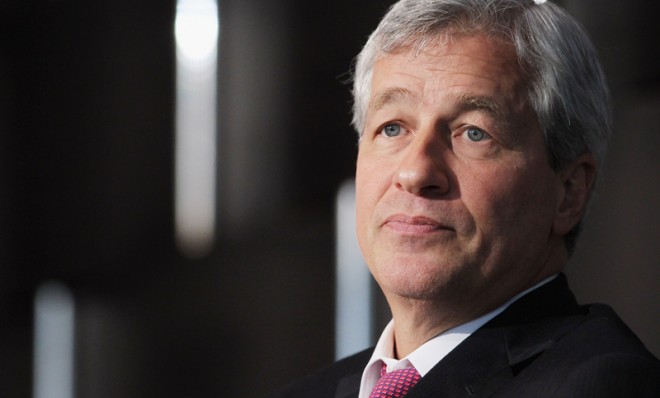How JPMorgan Chase allegedly tried to hide a $6.2 billion loss from the feds
A new Senate report revives the too-big-to-fail debate by accusing bank executives of misleading investors and regulators

A free daily email with the biggest news stories of the day – and the best features from TheWeek.com
You are now subscribed
Your newsletter sign-up was successful
JPMorgan Chase is the biggest of all the nation's big banks. So if any bank is too big too fail, it's JPMorgan.
But that hardly means JPMorgan Chase has a hall pass. Indeed, a tough new 300-page Senate report accuses the bank and CEO Jamie Dimon of hiding losses of around $6.2 billion from federal regulators.
The report alleges that JPMorgan executives intentionally misled investors and regulators over the "London Whale" trade, news of which first surfaced in May 2012. Back then, Dimon attributed the losses, initially estimated at around $2 billion, to "errors" and "bad judgment," according to CNNMoney. Specifically though, the loss stemmed from a complex deal involving credit default swaps — insurance-like contracts that essentially allow firms to bet on whether the value of a given asset will rise or fall.
The Week
Escape your echo chamber. Get the facts behind the news, plus analysis from multiple perspectives.

Sign up for The Week's Free Newsletters
From our morning news briefing to a weekly Good News Newsletter, get the best of The Week delivered directly to your inbox.
From our morning news briefing to a weekly Good News Newsletter, get the best of The Week delivered directly to your inbox.
The Senate report, as the Washington Post notes, "is the first to suggest that JPMorgan's chief executive Jamie Dimon was less than forthright with regulators as he learned of the mounting losses," alleging that he put a stop to the daily profit and loss statements that the bank's investment division had been sending to regulators.
For its part, JPMorgan has released a statement
We know we have made many mistakes related to the CIO matter, and we have already identified many of the issues cited in the report. We have taken significant steps to remediate these issues and to learn from them.
The main charge is that the bank "mischaracterized high-risk trading as hedging." Of course, Rolling Stone's resident rabble-rouser Matt Taibbi has a slightly harsher take on what happened:
If the information in the report is correct, Chase followed the behavioral model of every corrupt/failing hedge fund this side of Bernie Madoff and Sam Israel, only it did it on a much more enormous scale and did it with federally-insured deposits. The fund used (in part) federally-insured money to create, in essence, a kind of super high-risk hedge fund that gambled on credit derivatives, and just like Sam Israel did with his Bayou fund, when it got in trouble, it resorted to fudging its numbers in order to disguise the fact that it was losing money hand over fist.
Chase for years hid the very existence of this operation from banking regulators and lied about the purpose of the fund (saying it was purely a hedging operation when it stopped being a hedge and instead became a wild directional gamble), and it also changed the way it calculated the fund's value once it started to lose hundreds of millions of dollars. [Rolling Stone]
According to Bloomberg, the report also details an incident in which bank executives yelled at examiners from the Office of the Comptroller of the Currency and called them "stupid," as well as a transcript of a telephone call by "London Whale" trader Bruno Iksil saying that the pressure by his manager to value his portfolio $400 million above market prices was "getting idiotic."
A free daily email with the biggest news stories of the day – and the best features from TheWeek.com
"This bank appears to have entertained, even embraced, the idea that it was too big to fail," said Sen. John McCain this morning during a Senate subcommittee hearing, according to the New York Times. Jeff Macke at Yahoo believes the "report is both a slap at Mr. Dimon — a staunch critic of government involvement in banking regulations" — and yet another "salvo in the ongoing fight over the Volcker rule." Implementation of the Volcker rule, which was meant to stop exactly this sort of scenario (i.e. banks claiming risky trades as hedges), has been delayed by lobbying efforts.
As for the fate of JPMorgan Chase and Jamie Dimon, Mark T. Williams, a former Federal Reserve bank examiner, has a suggestion:
Too big to fail has been put back on the table -- not providing risk data, misleading shareholders -- this suggests that breaking up the banks is a viable idea. This big trading loss reinforces the need for independence. It’s kind of hard to argue at this point that JPM would’ve been worse off if they had a separate chairman. [Bloomberg]
Dimon, incidentally, won't be testifying today.
Keith Wagstaff is a staff writer at TheWeek.com covering politics and current events. He has previously written for such publications as TIME, Details, VICE, and the Village Voice.
-
 Samurai: a ‘blockbuster’ display of Japanese heritage
Samurai: a ‘blockbuster’ display of Japanese heritageThe Week Recommends British Museum show offers a ‘scintillating journey’ through ‘a world of gore, power and artistic beauty’
-
 BMW iX3: a ‘revolution’ for the German car brand
BMW iX3: a ‘revolution’ for the German car brandThe Week Recommends The electric SUV promises a ‘great balance between ride comfort and driving fun’
-
 Munich Security Conference: a showdown between Europe and Trump?
Munich Security Conference: a showdown between Europe and Trump?Today’s Big Question Report suggests European leaders believe they can no longer rely on the US for military support – but decoupling is easier said than done